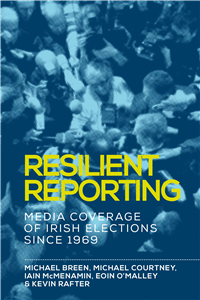Resilient reporting
Media coverage of Irish elections since 1969
by Michael Breen, Michael Courtney, Iain Mcmenamin, Eoin O'Malley, Kevin Rafter
Description
More Information
Rights Information
Albania, Algeria, Angola, Argentina, Armenia, Australia, Austria, Bahrain, Belgium, Belize, Benin, Bolivia, Bosnia and Herzegovina, Botswana, Brazil, Bulgaria, Burkina Faso, Burundi, Cameroon, Canada, Cape Verde, Central African Republic, Chad, Chile, China, Colombia, Comoros, Congo [DRC], Congo, Republic of the, Costa Rica, Ivory Coast, Croatia, Czech Republic, Denmark, Djibouti, Ecuador, Egypt, El Salvador, Equatorial Guinea, Eritrea, Estonia, Ethiopia, Faroe Islands, Finland, France, French Guiana, Gabon, Gambia, Georgia, Germany, Ghana, Greece, Guatemala, Guinea, Guinea-Bissau, Guyana, Honduras, Hongkong, Hungary, Iceland, India, Indonesia, Iran, Iraq, Ireland, Israel, Italy, Japan, Jordan, Kazakhstan, Kenya, Kuwait, Latvia, Lebanon, Lesotho, Liberia, Libya, Lithuania, Luxembourg, Macau, China, Macedonia [FYROM], Madagascar, Malawi, Malaysia, Mali, Malta, Mauritania, Mauritius, Mayotte, Mexico, Mongolia, Montenegro, Morocco, Mozambique, Namibia, Netherlands, New Zealand, Nicaragua, Niger, Nigeria, Norway, Oman, Pakistan, Panama, Paraguay, Peru, Philippines, Poland, Portugal, Puerto Rico, Qatar, Reunion, Romania, Russia, Rwanda, Saint Helena, Sao Tome and Principe, Saudi Arabia, Senegal, Serbia, Seychelles, Sierra Leone, Singapore, Slovakia, Slovenia, Somalia, South Africa, South Korea, Spain, Sri Lanka, Sudan, Suriname, Swaziland, Sweden, Switzerland, Syria, Taiwan, Tanzania, Thailand, Timor-Leste, Togo, Tokelau, Tunisia, Turkey, Uganda, Ukraine, United Arab Emirates, United Kingdom, United States, Uruguay, Venezuela, Vietnam, Western Sahara, Yemen, Zambia, Zimbabwe, South Sudan, Cyprus, Palestine, Bangladesh, Cambodia, Liechtenstein, Azerbaijan
Endorsements
Media hostility towards politicians and the political system, and its impact on democracy, has long attracted the interest of scholars of political communication. It is also the subject of political discourse and rhetoric, with the media attracting the ire of political leaders around the globe: Donald Trump, for one, has repeatedly called journalists 'the worst people in the world.' Trump is not the first, nor will he be the last, leader to seek to focus our attention on the role of the media in electoral politics. Resilient reporting examines how election news reporting has changed over the last half-century in Ireland by means of a unique dataset involving 25 million words from newspapers, as well as radio and television coverage. In a timely and revealing study, the authors examine reporting in terms of framing, tone, and the distribution of coverage. They also focus on how the economy has affected election coverage as well as media reporting of leaders and personalities, gender, and the effect of the commercial basis of media outlets. The authors evaluate three broad hypotheses about Ireland's election coverage since 1969: the extent to which the norms of critical impartiality have survived, whether the media has shifted towards hypercritical infotainment, and the extent to which content has been influenced by exogenous factors - that is, political, social, and economic factors outside the media itself. The findings, which are drawn from a machine-learning computer system involving a huge content analysis study, will interest academics as well as politicians and policymakers internationally.
Reviews
Media hostility towards politicians and the political system, and its impact on democracy, has long attracted the interest of scholars of political communication. It is also the subject of political discourse and rhetoric, with the media attracting the ire of political leaders around the globe: Donald Trump, for one, has repeatedly called journalists 'the worst people in the world.' Trump is not the first, nor will he be the last, leader to seek to focus our attention on the role of the media in electoral politics. Resilient reporting examines how election news reporting has changed over the last half-century in Ireland by means of a unique dataset involving 25 million words from newspapers, as well as radio and television coverage. In a timely and revealing study, the authors examine reporting in terms of framing, tone, and the distribution of coverage. They also focus on how the economy has affected election coverage as well as media reporting of leaders and personalities, gender, and the effect of the commercial basis of media outlets. The authors evaluate three broad hypotheses about Ireland's election coverage since 1969: the extent to which the norms of critical impartiality have survived, whether the media has shifted towards hypercritical infotainment, and the extent to which content has been influenced by exogenous factors - that is, political, social, and economic factors outside the media itself. The findings, which are drawn from a machine-learning computer system involving a huge content analysis study, will interest academics as well as politicians and policymakers internationally.
Author Biography
Kevin Rafter is head of the department of film and media at the Institute of Art, Design and Technology, Dun Laoghaire.
Manchester University Press
Manchester University Press is a leading UK publisher known for excellent research in the humanities and social sciences.
View all titlesBibliographic Information
- Publisher Manchester University Press
- Publication Date October 2022
- Orginal LanguageEnglish
- ISBN/Identifier 9781526119995 / 1526119994
- Publication Country or regionUnited Kingdom
- FormatPrint PDF
- Pages192
- ReadershipCollege/higher education; Professional and scholarly
- Publish StatusPublished
- Dimensions234 X 156 mm
- Biblio NotesDerived from Proprietary 4384
- Reference Code9191
Manchester University Press has chosen to review this offer before it proceeds.
You will receive an email update that will bring you back to complete the process.
You can also check the status in the My Offers area

Please wait while the payment is being prepared.
Do not close this window.



